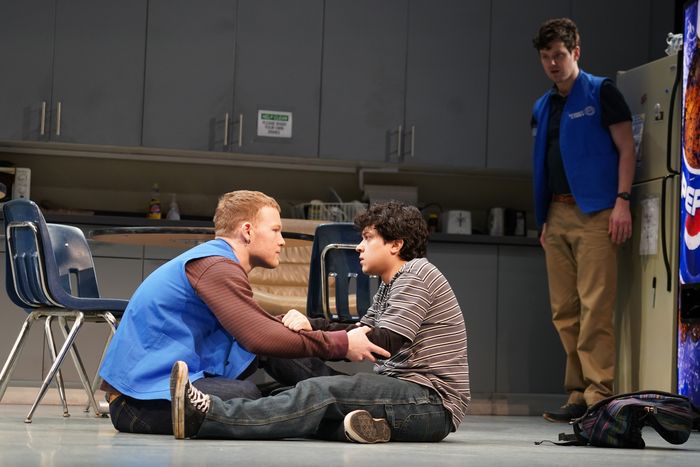
The break room at an Idaho Hobby Lobby is as good a place as any to wish for the end of the world. ThatÔÇÖs especially true of the one designed by Wilson Chin for A Bright New Boise at Signature Theatre ÔÇö a meticulously ominous space with a kitchen counter along the rear wall, a smattering of workplace-safety and -harassment posters, and a claustrophobic number of drawers. This is realism pitched to an unsettling extreme, a mundanity that starts to overwhelm us even before the play gets going.
If you know Samuel D. HunterÔÇÖs work, overwhelming realism is what youÔÇÖd expect. He has made a career of writing dramas primarily set in his home state with characters in situations that vary from dead-end to desperate with bleak humor and often more than a touch of mysticism. YouÔÇÖll see it all in this play ÔÇö a relatively early work that premiered at the Wild Project in 2010. (Back then, Scott Brown called it a ÔÇ£simple, superb little heartland heartbreaker.ÔÇØ) The action begins as Will (Peter Mark Kendall) applies for a job at Hobby Lobby, dodging manager PaulineÔÇÖs (Eva Kaminsky) questions about his previous employment as a church accountant. At first, Will seems like an everyman, and Kendall gives him an approachable reticence in the face of KaminskyÔÇÖs effectively broader portrayal of a small-time big-box tyrant. But soon, he starts to act in his own strange ways. He approaches a teenage employee named Alex (Ignacio Diaz-Silverio) and announces that heÔÇÖs his biological father. He reveals to Anna (Anna Baryshnikov honing a winsome ditziness), who hides out in the store after dark to read, that he is working on a novelesque blog. We eventually learn that the work is about the coming apocalypse.
Watching Will is a little like observing the proverbial frog in a pot of boiling water. YouÔÇÖre with him against the dreary slog of checking receipts and microwaving soup, but bit by bit, the hellfire behind his eyes reveals itself. The church where he used to work ÔÇö as AlexÔÇÖs artist brother, Leroy (Angus OÔÇÖBrien), soon prods him to admit ÔÇö was recently in the news for being an end-times cult, and Will hasnÔÇÖt given up on its teachings. Oliver ButlerÔÇÖs direction keeps things briskly ordinary and shot through with dread. The break-room interactions, part of PaulineÔÇÖs beloved retail ecosystem, are nearly in the sitcom realm of Superstore ÔÇö if David Lynch had stepped in to direct an episode or two. A television at the back of the room that usually shows ÔÇ£Hobby Lobby TVÔÇØ of two talking heads droning on about craft supplies sometimes gets the wrong signal and starts playing footage of surgeries. In scenes that take place outside of the building, Jennifer SchrieverÔÇÖs lighting isolates characters in inky blackness in front of bright bands of neon. WillÔÇÖs extremism is maybe a reasonable outgrowth from circumstances such as these. Hunter wants you on the fence ÔÇö with rapture on one side and boring old wage labor on the other.
WeÔÇÖre at a time of potentially peak Samuel D. Hunter. His residency at the Signature kicked off in May with the lovely new two-hander A Case for the Existence of God. He wrote the screenplay for the film version of The Whale (directed by Darren Aronofsky and featuring Brendan FraserÔÇÖs Oscar-nominated comeback role as an obese professor in the throes of self-destruction) just before Boise and staged it Off Broadway in 2012. In The Whale, you can observe all of HunterÔÇÖs typical fascinations ÔÇö thereÔÇÖs even a missionary from New Life, the same end-times congregation Will attended in Boise ÔÇö though the film seems to exaggerate and misunderstand them. Aronofsky cranks the tone up from everyday horror to gothic, lingering on shots of FraserÔÇÖs prosthetic bloat and deploying a sepulchral, string-heavy score. What humor there is in The WhaleÔÇÖs script seems sucked out of the movie ÔÇö save in Hong ChauÔÇÖs performance as FraserÔÇÖs friend and makeshift nurse. (Maybe, as an Off Broadway veteran, she was the only one who knew what tone to strike.) ThereÔÇÖs a fundamental discomfort in the way The Whale ogles its main characterÔÇÖs weight that IÔÇÖm not sure any approach could obviate (though I havenÔÇÖt seen a stage production myself), but Aronofsky and HunterÔÇÖs adaptation feels particularly wrongheaded. What works well in stagings of HunterÔÇÖs writing ÔÇö as Boise and Existence of God exemplify well ÔÇö is that the stress falls on the mundane with the extraordinary emerging like an exhalation. But the film tries to put the metaphor first, so thereÔÇÖs no space for the characters to breathe.
Speaking of which, in A Bright New Boise, Alex has panic attacks that stop his breathing, which only Leroy seems to know how to alleviate, and Will has a mantra  repeating now  now  now between breaths  that he recites in the first scene. Later, we see the world from Wills perspective, and theres a horror in the mantra that feels akin to that of Alexs panic attacks. The world is closing in, choking them both. I get panic attacks over nothing, Alex says at one point. Absolutely nothing. Ill be at work or at home or at school, and suddenly, Ill start shaking and I wont be able to breathe. That the panic comes on from the crushing nothing of it all is what links father to son. They both cant bear the now. Who can? Spend enough time in a break room, and youll want it to be consumed by flames too.
A Bright New Boise is at Signature Theatre through March 12.


